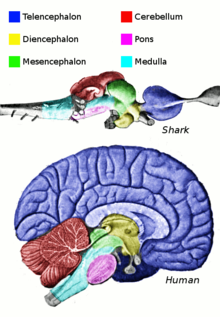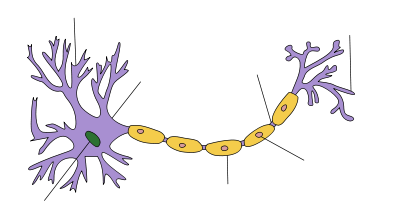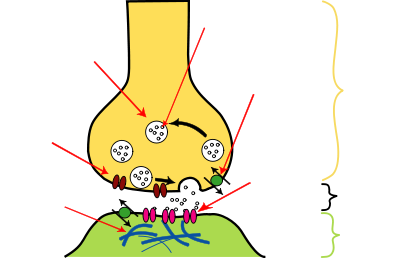- Outline of neuroscience
-
The following outline is provided as an overview of and topical guide to neuroscience:
Neuroscience – an interdisciplinary science that studies the nervous system.[1]
Contents
Nervous system
The nervous system is an organ system containing a network of specialized cells called neurons that coordinate the actions of an animal and send signals between different parts of its body.
- Neuron
- Interneuron
- Ganglion (PNS) vs Nucleus (neuroanatomy) (CNS)
- Nerve(PNS) vs Tract (neuroanatomy) (CNS)
- White matter (more myelinated) vs Grey matter
Central nervous system
The central nervous system (CNS) is the largest part of the nervous system, and includes the brain and spinal cord.
Peripheral nervous system
The peripheral nervous system (PNS) is a collective term for the nervous system structures that do not lie within the CNS.
Peripheral
nervous
systemby direction afferent system efferent system By function Somatic Autonomic Sympathetic Parasympathetic Enteric Glial cells
Glial cells, commonly called neuroglia or glia, are supportive cells that maintain homeostasis, form myelin, and provide support and protection for the brain's neurons.
- Microglia
- Astrocyte
- Oligodendrocyte (CNS) vs Schwann cell (PNS)
Nervous system (TA A14, GA 9) Central nervous system Peripheral nervous system Histology: nervous tissue (TA A14, GA 9.849, TH H2.00.06, H3.11) CNS GeneralGrey matter · White matter (Projection fibers · Association fiber · Commissural fiber · Lemniscus · Funiculus · Fasciculus · Decussation · Commissure) · meningesOtherPNS GeneralPosterior (Root, Ganglion, Ramus) · Anterior (Root, Ramus) · rami communicantes (Gray, White) · Autonomic ganglion (Preganglionic nerve fibers · Postganglionic nerve fibers)Myelination: Schwann cell (Neurolemma, Myelin incisure, Myelin sheath gap, Internodal segment)
Satellite glial cellNeurons/
nerve fibersPartsPerikaryon (Axon hillock)
Axon (Axon terminals, Axoplasm, Axolemma, Neurofibril/neurofilament)
Dendrite (Nissl body, Dendritic spine, Apical dendrite/Basal dendrite)TypesGSA · GVA · SSA · SVA
fibers (Ia, Ib or Golgi, II or Aβ, III or Aδ or fast pain, IV or C or slow pain)GSE · GVE · SVE
Upper motor neuron · Lower motor neuron (α motorneuron, γ motorneuron, β motorneuron)Termination SynapseNervous system physiology: neurophysiology / clinical neurophysiology Primarily CNS Primarily PNS Both Bereitschaftspotential · P300 · Auditory evoked potential · Somatosensory evoked potentials · Somatosensory evoked potentials · Visual evoked potentialOther short termLong termOtherBrain
The brain is the center of the nervous system in all vertebrate, and most invertebrate, animals.
- Human brain
- List of regions of the human brain
Principal regions of the vertebrate brain:
Brain Forebrain Telencephalon Rhinencephalon, Amygdala, Hippocampus, Neocortex, Lateral ventricles, Basal ganglia
Diencephalon Epithalamus, Thalamus, Hypothalamus, Subthalamus, Pituitary gland, Pineal gland
Midbrain Tectum, Cerebral peduncle, Pretectum, Mesencephalic duct
Hindbrain Metencephalon Myelencephalon Medulla oblongata Neuron
Structure of a typical neuron Neuron A neuron (also known as a neurone or nerve cell) is an excitable cell in the nervous system that processes and transmits information by electrochemical signaling. Neurons are the core components of the brain, spinal cord, and peripheral nerves.
Action potential
An action potential (or nerve impulse) is a transient alteration of the transmembrane voltage (or membrane potential) across the membrane in an excitable cell generated by the activity of voltage-gated ion channels embedded in the membrane. The best known action potentials are pulse-like waves that travel along the axons of neurons.
- Membrane potential
- Ion channel
- Voltage-gated ion channels
Synapse
Structure of a typical chemical synapse Synapses are specialized junctions through which neurons signal to each other and to non-neuronal cells such as those in muscles or glands.
Neurotransmitter
Neurotransmitters are endogenous chemicals that relay, amplify, and modulate signals between neurons and other cells to which they are synaptically connected.
- List of neurotransmitters
- Neuromodulator
- Monoamine neurotransmitter
- Neuropeptide
Neurotransmitter receptor
A neurotransmitter receptor is a membrane receptor that can be activated by a neurotransmitter. Interactions between neurotransmitters and neurotransmitter receptors can evoke a wide range of differing responses from the cell receiving the signal, including excitation, inhibition, and various types of modulation.
- Category:Receptors
Biological neural network
A biological neural network is a population of physically interconnected neurons that act cooperatively to form a functional circuit. Computer scientists and engineers also study artificial neural networks formed by simplified mathematical abstractions of the signaling properties of biological neurons.
Neural development
Neural development comprises the processes that generate, shape, and reshape the nervous system, from the earliest stages of embryogenesis to the final years of life.
- Neural plasticity
- Neurogenesis
- Neuroregeneration
Prenatal development/Mammalian development of nervous system (GA 9.733 and GA 10.1002, TE E5.13-16) Neurogenesis Cranial neural crest (Cardiac neural crest complex) · Truncal neural crestRostral neuropore
Cephalic flexure · Pontine flexure
Alar plate (sensory) · Basal plate (motor)
Germinal matrixEye development Auditory development M: EYE
anat(g/a/p)/phys/devp/prot
noco/cong/tumr, epon
proc, drug(S1A/1E/1F/1L)
M: EAR
anat(e/p)/phys/devp
noco/cong, epon
proc, drug(S2)
Sensory system
A sensory system is a part of the nervous system responsible for processing sensory information. A sensory system consists of sensory receptors, neural pathways, and parts of the brain involved in sensory perception.
- List of sensory systems
- Sensory neuron
- Perception
- Visual system
- Auditory system
- Somatosensory system
- Vestibular system
- Olfactory system
- Taste
- Pain
Motor control
Motor control comprises the activities carried out by the nervous system that organize the musculoskeletal system to create coordinated movements and skilled actions.
Learning and memory
"Memory" is an organism's ability to store, retain, and recall information. "Learning" means acquiring new knowledge, behaviors, skills, values, preferences or understanding, and may involve synthesizing different types of information.
- Amnesia
- Synaptic plasticity
- Classical conditioning
- Reward learning
- Imprinting (psychology)
Cognition
The term "cognition" refers to the activities involved in processing information, applying knowledge, and changing preferences. Cognition, or cognitive processes, can be natural or artificial, conscious or unconscious.
- Mind
- Consciousness
- Neural correlates of consciousness
- Attention
- Emotion
- Intelligence
- Decision-making
- Executive function
Arousal
Arousal is a physiological and psychological state of being awake or reactive to stimuli.
Neuroscience
Neuroscience is the scientific study of the nervous system. Traditionally, neuroscience has been seen as a branch of biology. Currently it has become an interdisciplinary science that involves other disciplines such as cognitive and neuro-psychology, computer science, statistics, physics, philosophy, and medicine.
- History of neuroscience
- Neuron doctrine
- List of neuroscience organizations
- List of neuroscientists
- Category:Neuroscientists
- Category:History of neuroscience
Neurophysiology
Neurophysiology is the study of the function (as opposed to structure) of the nervous system.
- Electrophysiology
- Extracellular recording
- Intracellular recording
- Brain stimulation
- Electroencephalography
- Category:Neurophysiology
Neuroanatomy
Neuroanatomy is the study of the anatomy of nervous tissue and neural structures of the nervous system.
Neuropharmacology
Neuropharmacology is the study of how drugs affect cellular function in the nervous system.
- Drug
- Psychoactive drug
- Anaesthetic
- Narcotic
Medication > Pharmacology Pharmacokinetics Pharmacodynamics Agonism and antagonism Agonist: Inverse agonist • Irreversible agonist • Partial agonist • Superagonist • Physiological agonist
Antagonist: Competitive antagonist • Irreversible antagonist • Physiological antagonist
Other: Binding • Affinity • Binding selectivity • Functional selectivityOther Related fields/subfields Behavioral neuroscience
Behavioral neuroscience, also known as biological psychology, biopsychology, or psychobiology, is the application of the principles of biology to the study of mental processes and behavior in human and non-human animals.
Developmental neuroscience
Developmental neuroscience aims to describe the cellular basis of brain development and to address the underlying mechanisms. The field draws on both neuroscience and developmental biology to provide insight into the cellular and molecular mechanisms by which complex nervous systems develop.
Cognitive neuroscience
Cognitive neuroscience is concerned with the scientific study of biological substrates underlying cognition, with a focus on the neural substrates of mental processes.
Systems neuroscience
Systems neuroscience is a subdiscipline of neuroscience which studies the function of neural circuits and systems. It is an umbrella term, encompassing a number of areas of study concerned with how nerve cells behave when connected together to form neural networks.
Molecular neuroscience
Molecular neuroscience is a branch of neuroscience that examines the biology of the nervous system with molecular biology, molecular genetics, protein chemistry and related methodologies.
Computational neuroscience
Computational neuroscience includes both the study of the information processing functions of the nervous system, and the use of digital computers to study the nervous system. It is an interdisciplinary science that links the diverse fields of neuroscience, cognitive science and psychology, electrical engineering, computer science, physics and mathematics.
- Neural network
- Neuroinformatics
- Brain-computer interface
- Mathematical neuroscience
Neurophilosophy
Neurophilosophy or "philosophy of neuroscience" is the interdisciplinary study of neuroscience and philosophy. Work in this field is often separated into two distinct approaches. The first approach attempts to solve problems in philosophy of mind with empirical information from the neurosciences. The second approach attempts to clarify neuroscientific results using the conceptual rigor and methods of philosophy of science.
Neuroscience Affective neuroscience · Behavioral neurology · Behavioral genetics · Behavioral neuroscience · Brain–computer interface · Chronobiology · Clinical neurophysiology · Clinical neuroscience · Cognitive neuroscience · Computational neuroscience · Connectomics · Evolution of nervous systems · Imaging genetics · Integrative neuroscience · Molecular cellular cognition · Neural development · Neural engineering · Neural network (both artificial and biological) · Neural signal processing · Neural tissue regeneration · Neuroanatomy · Neurobioengineering · Neurobiology · Neurobiotics · Neurocardiology · Neurochemistry · Neurochip · Neurodegeneration · Neurodevelopmental disorders · Neurodiversity · Neuroembryology · Neuroendocrinology · Neuroepidemiology · Neuroethics · Neuroethology · Neurogastroenterology · Neurogenetics · Neuroimaging · Neuroimmunology · Neuroinformatics · Neurointensive care · Neurolinguistics · Neurology · Neurometrics · Neuromodulation · Neuromonitoring · Neurooncology · Neuro-ophthalmology · Neuropathology · Neuropharmacology · Neurophilosophy · Neurophysics · Neurophysiology · Neuroplasticity · Neuroprosthetics · Neuropsychiatry · Neuropsychology · Neuroradiology · Neurorehabilitation · Neurorobotics · Neurosurgery · Neurotechnology · Neurotology · Neurotoxin · Neurotransmitter · Neurovirology · Psychiatry · Sensory neuroscience · Social neuroscience · Systems neuroscience
Neurology
Neurology is the medical specialty dealing with disorders of the nervous system. It deals with the diagnosis and treatment of all categories of disease involving the central, peripheral, and autonomic nervous systems.
- Stroke
- Parkinson's disease
- Alzheimer's disease
- Huntington's disease
- Multiple sclerosis
- Amyotrophic lateral sclerosis
- Rabies
- Schizophrenia
- Epilepsy
- Hydrocephalus
- Brain damage
- Traumatic brain injury
- Closed head injury
- Coma
- Paralysis
- Level of consciousness
- Neurosurgery
Neuropsychology
Neuropsychology studies the structure and function of the brain related to psychological processes and behaviors. The term is used most frequently with reference to studies of the effects of brain damage in humans and animals.
Pathology of the nervous system, primarily CNS (G04–G47, 323–349) Inflammation Encephalitis (Viral encephalitis, Herpesviral encephalitis) · Cavernous sinus thrombosis · Brain abscess (Amoebic)Myelitis: Poliomyelitis · Demyelinating disease (Transverse myelitis) · Tropical spastic paraparesis · Epidural abscessBoth/eitherBrain/
encephalopathyBasal ganglia disease: Parkinsonism (PD, Postencephalitic, NMS) · PKAN · Tauopathy (PSP) · Striatonigral degeneration · Hemiballismus · HD · OADyskinesia: Dystonia (Status dystonicus, Spasmodic torticollis, Meige's, Blepharospasm) · Chorea (Choreoathetosis) · Myoclonus (Myoclonic epilepsy) · Akathesiaautoimmune (Multiple sclerosis, Neuromyelitis optica, Schilder's disease) · hereditary (Adrenoleukodystrophy, Alexander, Canavan, Krabbe, ML, PMD, VWM, MFC, CAMFAK syndrome) · Central pontine myelinolysis · Marchiafava-Bignami disease · Alpers' diseaseEpisodic/
paroxysmalIntracranial hypertension (Hydrocephalus/NPH, Idiopathic intracranial hypertension) · Cerebral edema · Intracranial hypotensionOtherSpinal cord/
myelopathyBoth/either LMN only: PMA · PBP (Fazio-Londe, Infantile progressive bulbar palsy) · SMA (SMN-linked, Kennedy disease, SMAX2, DSMA1)both: ALSSurgery, Nervous system: neurosurgical and other procedures (ICD-9-CM V3 01–05+89.1, ICD-10-PCS 00-01) Skull CNS thalamus and globus pallidus: Thalamotomy · Thalamic stimulator · Pallidotomy
ventricular system: Ventriculostomy · Suboccipital puncture · Intracranial pressure monitoring
cerebrum: Psychosurgery (Lobotomy, Bilateral cingulotomy) · Hemispherectomy · Anterior temporal lobectomy
pituitary: Hypophysectomy
hippocampus: Amygdalohippocampectomy
Brain biopsyCerebral meningesSpinal cord and roots (Cordotomy, Rhizotomy)
Vertebrae and intervertebral discs: see Template:Bone, cartilage, and joint proceduresCT head · Cerebral angiography · Pneumoencephalography · Echoencephalography/Transcranial doppler · MRI of brain and brain stem · Brain PET · SPECT of brain · MyelographyDiagnosticPNS Sympathetic nerves or gangliaNerves (general)DiagnosticRelated sciences
- Cognitive science
- Psychology
- Molecular biology
- Psychiatry
- Neurosurgery
- Linguistics
- Developmental biology
- Biotechnology
- Neurophilosophy
See also
References
- ^ "Neuroscience". Merriam-Webster Medical Dictionary. http://www.merriam-webster.com/medlineplus/neuroscience.
Systems and systems science Systems categories Systems Biological · Complex · Complex adaptive · Conceptual · Database management · Dynamical · Economical · Ecosystem · Formal · Global Positioning System · Human anatomy · Information systems · Legal systems of the world · Systems of measurement · Metric system · Multi-agent system · Nervous system · Nonlinearity · Operating system · Physical system · Political system · Sensory system · Social structure · Solar System · Systems artTheoretical fields Systems scientists Russell L. Ackoff · William Ross Ashby · Béla H. Bánáthy · Gregory Bateson · Richard E. Bellman · Stafford Beer · Ludwig von Bertalanffy · Murray Bowen · Kenneth E. Boulding · C. West Churchman · George Dantzig · Heinz von Foerster · Jay Wright Forrester · George Klir · Edward Lorenz · Niklas Luhmann · Humberto Maturana · Margaret Mead · Donella Meadows · Mihajlo D. Mesarovic · James Grier Miller · Howard T. Odum · Talcott Parsons · Ilya Prigogine · Anatol Rapoport · Claude Shannon · Francisco Varela · Kevin Warwick · Norbert Wiener · Anthony Wilden · Charles A S Hall
Human systems and organs TA 2–4:
MSBone (Carpus · Collar bone (clavicle) · Thigh bone (femur) · Fibula · Humerus · Mandible · Metacarpus · Metatarsus · Ossicles · Patella · Phalanges · Radius · Skull (cranium) · Tarsus · Tibia · Ulna · Rib · Vertebra · Pelvis · Sternum) · CartilageTA 5–11:
splanchnic/
viscusmostly
Thoracicmostly
AbdominopelvicDigestive system+
adnexaMouth (Salivary gland, Tongue) · upper GI (Oropharynx, Laryngopharynx, Esophagus, Stomach) · lower GI (Small intestine, Appendix, Colon, Rectum, Anus) · accessory (Liver, Biliary tract, Pancreas)TA 12–16 Blood
(Non-TA)General anatomy: systems and organs, regional anatomy, planes and lines, superficial axial anatomy, superficial anatomy of limbs Categories:- Biology lists
- Neuroscience
- Outlines
- Psychology lists
Wikimedia Foundation. 2010.




